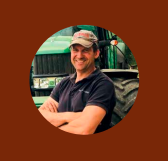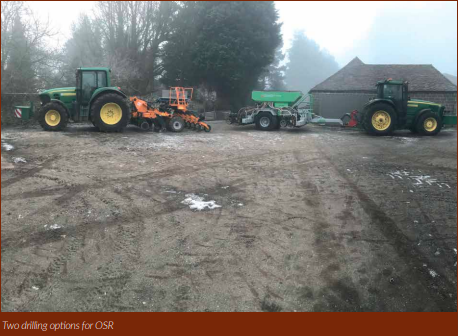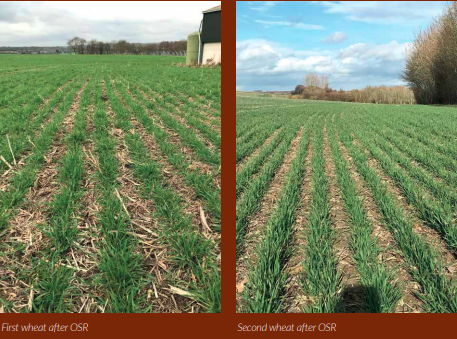Learning from our mistakes!

One of the strangely satisfying things about farming is the opportunity we get each year to wipe the slate clean and plant a new crop into a field. Whether the previous crop had ranged from outstandingly good to outrageously bad we all get the opportunity to start again! This year I’m really looking forward to that “starting again” on more than a couple of fields. We all wish we could grow 12t/ha+ crops of wheat every year on every field (and I’m sure there is someone doing just that sitting at the bar in their local public house!) but the reality for many of us is that we have some fields that “perform” well most years and others that are just always more hard work.
The real frustration is when crops are planted in good conditions and into “good land” and then fail to deliver. That has happened on a number of our Oilseed Rape crops this year and I’m still scratching my head as to why. Strangely enough the headlands have emerged and developed well but it’s the middles of the fields in many cases where emergence and development have been frustratingly slow.

With slugs, CSFB, rabbits and pigeons this crop is starting to lose favour here with us. I guess it’s just typical, or a further development of my character, that this coincides with the year I’ve decided to invest in a low disturbance subsoiler with a small grain seeder to plant Oilseed Rape with a companion crop. (facepalm emoji would nicely sum that investment up!) Whether that ever happens now is debatable but at least we have the subsoiler for contracting and occasional soil rehabilitation where required.

On a brighter note the second wheat that for the most part of winter has just looked like stripey stubble has begun to turn green! The rows of wheat that I and my agronomist insisted were there have decided to make an appearance above the previous wheat stubble and the recent spell of warm weather combined with some early applied liquid nitrogen have seen crops move forward to a place where my ego is slightly less dented! Wheat after Oats is also pulling away nicely after a fairly slow start but the star of the show and the pictures that most often appear on my Twitter homepage are of wheat after Oilseed Rape planted straight into the regrowth.
The evenness we are seeing now after 7 autumns with the no-till approach is really encouraging. I would even say that headlands are establishing better than the middles of fields. That’s even more encouraging when your field are small! Looking forward to this spring we will be planting a larger than expected area of spring beans for ourselves and another farmer locally. We didn’t plant in the warm dry weather at the end of February as I was convinced winter wasn’t finished and the “River Fields” were bound to flood if I planted too early!
This winter has been relatively quiet and relaxing. We haven’t had many major projects to consider and other than a few meetings, shows and discussions, life has been steady. No major machinery has been changed and we are getting ready for an expected period of uncertainty given the current political situations! I’m very blessed to have farmed for the past 25 years with my Dad and this continues with only a little part time help and an occasional contractor to help out when required. But like many other father and son farming businesses there will come a time when Dad is unable to continue for whatever reason and I’ll have to either employ someone or invest in faster or wider (or both) machinery so as to cover the workload single handedly. The shortage of skilled farm labour with the ability to operate the machinery of today is a concern to me.
Perhaps collaboration with a likeminded neighbour is the way forward. Perhaps we will all be operating a fleet of robots from the comfort of our arm chair or the seat of our electric pickup?! Or perhaps, as a number of UK farmers are looking at, we will be pulling 12m notill drills and 36m sprayers with 240hp tractors and covering vast areas of land with just one man?! I’m very interested to see what’s ahead and keen to embrace the opportunities that come my way. I’m sure there will be much more learning on the way and many more mistakes made on that journey. But as someone once said “it’s better to have tried and failed than to have never tried at all” Keep trying new things, keep learning and keep advancing your farming system. Till next time!
